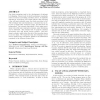5128 search results - page 18 / 1026 » When Abstraction Fails |
SAGT
2009
Springer
14 years 1 months ago
2009
Springer
Abstract. A mechanism is manipulable if it is in some agents’ best interest to misrepresent their private information. The revelation principle establishes that, roughly, anythin...
JSAC
2010
13 years 5 months ago
2010
Abstract—Random linear network coding can be used in peerto-peer networks to increase the efficiency of content distribution and distributed storage. However, these systems are ...
RV
2010
Springer
13 years 5 months ago
2010
Springer
Abstract. We present a new approach for developing robust software applications that breaks dependences on the failed parts of an application’s execution to allow the rest of the...
ICSE
2008
IEEE-ACM
14 years 7 months ago
2008
IEEE-ACM
One time-consuming task in the development of software is debugging. Recent work in fault localization crosschecks traces of correct and failing execution traces, it implicitly se...
AGP
2010
IEEE
13 years 10 months ago
2010
IEEE
This chapter tackles the relation between declarative languages and multi-agent systems by following the dictates of the five Ws (and one H) that characterize investigations. The ...

